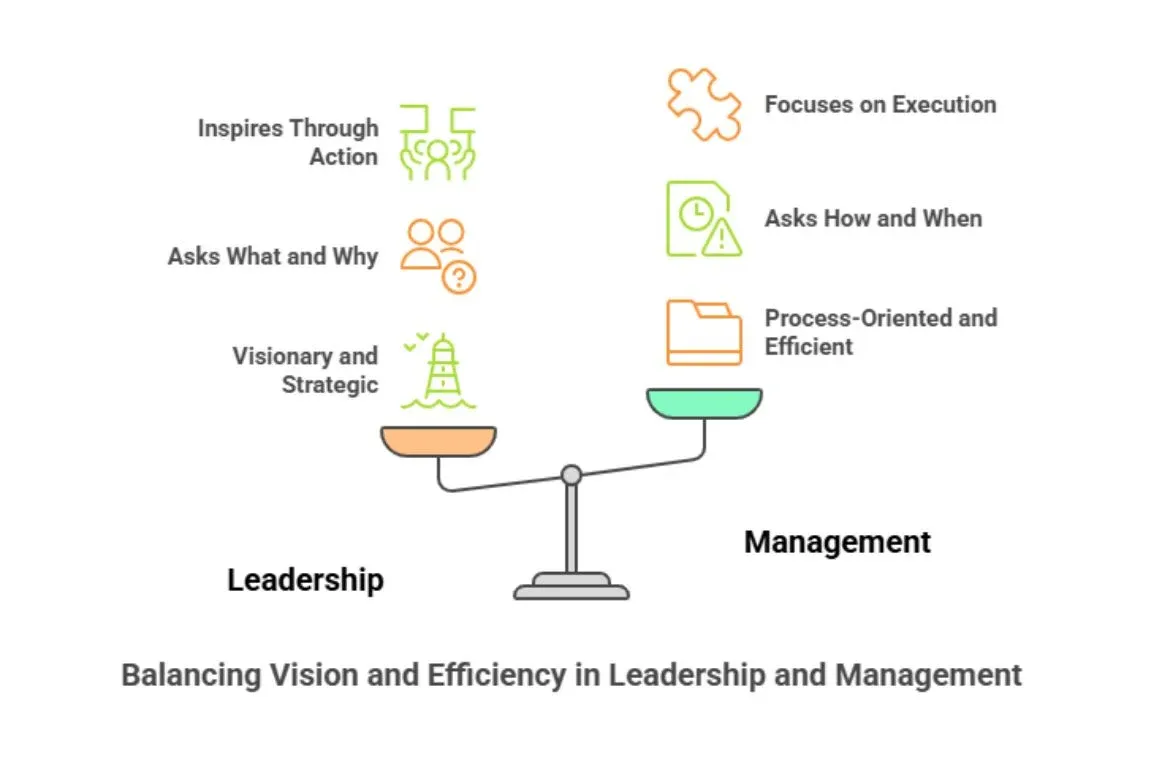What is Leadership in Management & Why is it essential?

Leadership is more than a title, it's a driving force behind successful management.
Leadership in management drives organizational success. 83% of enterprises recognize they need to develop leaders at all levels. Yet only 5% of businesses have started leadership development programmes. This creates a major gap in what organizations can achieve.
The data speaks volumes about its impact in shaping high-performing teams and resilient organizations. In this blog, we’ll explore what leadership in management truly means, the essential traits of effective leaders, and how leadership has evolved in today’s dynamic workplace. You’ll also discover practical ways to develop leadership skills, assess your potential, and leverage formal learning to advance your career in management.
Understanding Leadership in Management: Beyond Authority
"Management is doing things right; leadership is doing the right things." — Peter F. Drucker, Management consultant, educator, and author
Beyond traditional power structures, leadership in management stands out as a powerful force that shapes how organizations progress. Research shows 83% of businesses see the value in developing leaders across all levels, yet only 5% achieve this goal. This gap shows we need to better understand the key differences between leading and managing.
Difference between leading and managing

Conceptualizing and defining leadership and management has always been difficult
Leaders create positive, game-changing improvements through vision and strategic thinking. Managers focus on keeping systems and processes running smoothly. Leaders ask what and why, while managers tackle how and when.
True leadership comes from actions, not titles. It inspires others through behaviour and values rather than contractual duties. Management's strength lies in making processes better and ensuring teams complete tasks with available resources.
Why organizations need leaders, not just managers?
Organizations thrive when they have both strong leaders and capable managers. Leadership sparks creativity and innovation. Management keeps operations running efficiently.
Companies without good leaders often become too bureaucratic and afraid to try new things. On the other side, organizations with powerful leaders but weak managers can become chaotic and make changes without good reason. The most successful organizations strike a balance between both skills. Leaders set the vision, and managers bring it to life.
The impact of effective leadership on organizational success
Good leadership shapes how organizations behave and perform. Leaders express purpose and direction that gives employees clear goals and lines up their actions with company objectives.
Employee engagement directly links to leadership quality—69% of employees report they would work harder if someone recognised their efforts. Leadership also creates a safe environment that promotes innovation and builds strong teams.
Essential Characteristics of Leadership in Management
"The very essence of leadership is that you have to have vision. You can't blow an uncertain trumpet." — Theodore M. Hesburgh, President Emeritus of the University of Notre Dame
Leadership success in management depends on specific traits that set great leaders apart from good managers. Professionals who want to lead organizations through complex business situations must understand and develop these characteristics.
Vision and strategic thinking
Great leaders have a clear and compelling vision that gives their organizations purpose and direction. The ability to review, assess and create strategies helps achieve long-term objectives. Leaders who think strategically put their bold vision into a framework with specific goals and action plans.
Emotional intelligence and relationship building
Emotional intelligence is the life-blood of good leadership that lets managers handle relationships wisely and with empathy. This skill includes four main parts: self-awareness, self-management, social awareness, and relationship management.
Leaders who show empathy build trust with their teams and this directly affects how engaged and productive employees become. Strong relationships matter because leaders can't unite teams or finish projects without them.
Decision-making capabilities
The ever-changing business world demands leaders to make strategic choices quickly even before they have all the information. They must balance competing needs and make tough choices when needed. Good decision-makers look at risks and opportunities while staying focused on company goals.
Adaptability in changing environments
Adaptability stands out as the most crucial trait great leaders need. This quality combines flexibility with versatility knowing how to see the big picture and adjust to moving targets of success. Of course, adaptable leaders promote state-of-the-art ideas in their organizations by encouraging teams to explore new concepts and question existing methods.
Developing Your Leadership Capabilities
Well-planned, structured development builds exceptional leadership in management capabilities. Strategic leadership development produces better organizational performance and personal growth than random approaches.
Self-assessment: Identifying your leadership strengths
Leaders need to understand their current strengths and weaknesses. Self-assessment helps professionals understand their leadership style and growth areas better. Self-awareness creates a strong foundation for growth. Leaders can maximise their unique contributions and delegate tasks that don't match their core strengths.
Creating a personal leadership development plan
A leadership development plan guides you toward achieving leadership goals. Good plans include clear, SMART objectives that match both organizational needs and personal goals. The best plans include different learning methods like mentoring, job rotations, professional courses, and certifications.
Learning from leadership challenges
Great leaders know failure helps them grow. They create learning cultures where people take responsibility without fear of blame or punishment. Research with more than 20,000 executives identified six key skills: anticipation, challenge, interpretation, decision-making, arrangement, and learning.
Conclusion
Leadership in management makes the difference between thriving organizations and those that barely survive. Digital literacy and these core traits are the foundations of a modern leader's toolkit.
In today’s fast-changing business environment, strong leadership is not just valuable it’s essential. As organizations increasingly embrace digital transformation, the intersection of leadership and emerging technologies like AI is becoming more critical than ever.
If you're looking to elevate your leadership capabilities in this new era, the AI for leaders Leadership for the Future program by IIM Calcutta and TalentSprint is a compelling next step. Designed for senior professionals and decision-makers, this program helps you understand and apply AI strategically to lead more effectively in a data-driven world. The digital business leadership programme designed for business leaders, CXOs, and entrepreneurs aiming to harness AI and digital technologies strategically for long-term competitive advantage.
In today’s dynamic business world, leadership in management is essential to drive teams, innovation, and growth. To lead effectively in this evolving landscape, structured learning can make all the difference.
Frequently Asked Questions
Q1. What is the difference between leadership and management?
Leadership focuses on creating positive change through vision and strategic thinking, while management concentrates on maintaining efficient systems and processes. Leaders inspire and set direction, whereas managers ensure task completion and resource utilization.
Q2. Why is emotional intelligence important for leaders?
Emotional intelligence enables leaders to handle interpersonal relationships judiciously and empathetically. Leaders with high emotional intelligence are viewed as better performers, build trust with their teams, and directly influence employee engagement and productivity.
Q3. What is the leadership of management?
Leadership in management refers to guiding and influencing a team to achieve organizational goals. It involves vision, motivation, decision-making, and accountability.
Q4. What are the 4 types of leadership?
The four common types are autocratic, democratic, transformational, and laissez-faire. Each style varies in how decisions are made and how teams are led.
Q5. What is the definition of leadership?
Leadership is the ability to inspire, guide, and influence others toward a shared vision or goal. It involves communication, direction, and motivation.
Q6. Why is leadership important in management?
Leadership drives team performance, builds trust, and ensures effective execution of business strategies. It plays a crucial role in navigating change and fostering innovation.

TalentSprint
TalentSprint is a leading deep-tech education company. It partners with esteemed academic institutions and global corporations to offer advanced learning programs in deep-tech, management, and emerging technologies. Known for its high-impact programs co-created with think tanks and experts, TalentSprint blends academic expertise with practical industry experience.



